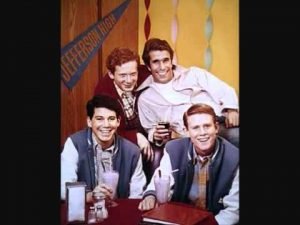

After Fonzie leaves, the boys start their "Dial Tones" rehearsal. Chachi then informs everyone that Fonzie's former flame, Pinky Tuscadero, is coming to Milwaukee to host the dance contest. This is interrupted when Ralph, Potsie, and Chachi drop by.

The next morning, Lori Beth tells how all the other girls are getting engaged before going to college, and she wants to know why she is not. Arthur Fonzerelli (Fonzie) vows to save the day. Arnold breaks the bad news that a construction company has plans to turn his restaurant into a mall. His friends and family meet at Arnold's malt shop, and, together, bid the audience welcome ("Welcome to Wisconsin"). In 2014, a re-recorded version of the song was used in commercials for Target.It is 1959 in Milwaukee, Wisconsin and Richie Cunningham and his best friends Potsie Weber and Ralph Malph are about to graduate high school and go off to college. It became their biggest hit single in Australia, reaching No. Australian band Silver Studs also recorded a version of the theme for their debut album. Pratt & McClain's album version of the song, recorded in 1976, peaked at No.

Bobby Arvon recorded an updated version of the song in 1983 for the opening and closing credits of Season 11, with the same lyrics as the version used for seasons 3-10. Pratt & McClain released the song as a single in 1976 from their album Pratt & McClain Featuring Happy Days.

The song was re-recorded in 1975 with different lyrics for both the opening and closing credits for Seasons 3 through 10. These versions of the song were used only during the closing credits of Seasons 1 and 2, with an updated version of "Rock Around the Clock" by Bill Haley and His Comets used as the opening theme. The song was first recorded in 1974 by Jim Haas with a group of other session singers for the first two seasons. It can be heard during the TV show's opening and closing credits as it runs in perpetual rerun syndication. It is the theme song of the 1970s television series Happy Days. "Happy Days" is a song written by Norman Gimbel and Charles Fox.


 0 kommentar(er)
0 kommentar(er)
